Ian Melin-Jones
Launch of UK’s largest provider of industrial heat exchanger solutions
The UK’s largest provider of design, manufacture and support services for heat exchanger and boiler equipment for the pulp and paper industry has been created through a new partnership between Green’s and Thornhill.
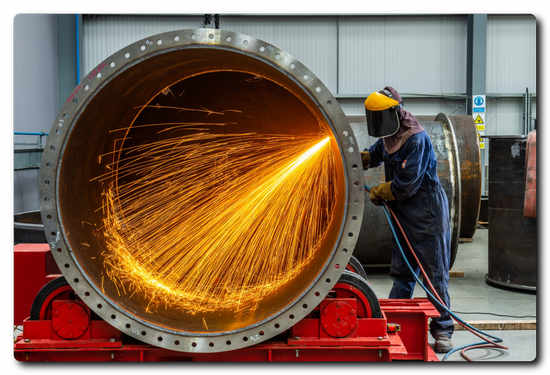
With multiple UK sites offering in-house design, fabrication, testing, repair and refurbishment complemented by on-site inspections, repairs and installation, the combined group offers the UK’s widest range of services available from one supplier.
Green’s managing director Matthew Crewe says: “Our international business has grown significantly over the past two years and now accounts for two thirds of our turnover. We see the opportunity to bring Thornhill’s tried and tested heat exchanger technology and services to our customers in the UK and overseas as a great addition to our existing product range.”
Thornhill’s managing director Simon Tin says: “We work in the same industries as Green’s so to be able to offer our current and prospective customers a broader range of products and services will add significantly to the value we can provide.”
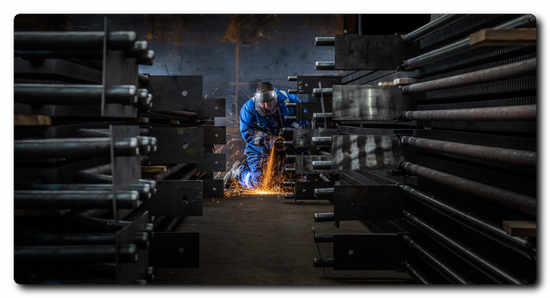
About Green’s
Wakefield based Green’s has been designing and manufacturing industrial boiler equipment since 1821 and has an 8,500 sq m factory that has shipped products weighing some 5,000 tonnes to 15 countries in 2018. While over the past 12 months Green’s services team have travelled to 24 countries, worked on 57 marine vessels and supplied more than 7,500 spare parts.
About Thornhill
Thornhill, which has sites in Yorkshire, the North East and the Midlands provides is the only UK provider of the complete cycle of heat exchanger services encompassing design, engineering, installation, repairs and servicing. The company comprises:
- Thornhill Engineering Services - Designs and manufactures large heat exchangers and provides on-site installation and servicing backed by in-house aftercare facilities
- Thornhill Rubber - Manufactures plate heat exchanger gaskets and products for construction
- Thornhill Rail – Designs, manufactures and services cooler units and associated equipment for rail
Leading tissue manufacturer Sofidel is named as one of the businesses leading the way in tackling climate change
CDP is a global disclosure system that enables companies, cities, states and regions to measure and manage their environmental impacts. In 2018, Sofidel improved its score in the Climate Change and Forests Timber categories.
Sofidel, one of the global leading manufacturers of tissue paper for hygienic and domestic use, has further improved its performance within the CDP Report 2018, a global disclosure system that enables companies, cities, states and regions to measure and manage their environmental impacts. The Group – particularly well-known for its Regina brand – has been awarded an A- rating in the Climate Change category and an A- rating in the Forests Timber category, in both cases earning a place in the highest (Leadership) scoring echelons of the report.
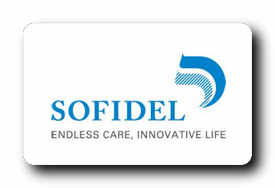 In its sector, Paper & Forestry, Sofidel ranked among the top businesses in the Climate Change category, above the sector average at global (C) and European (B-) level, and among the top businesses in the Forests Timber category, above the sector average at global (B-) and European (B-) level.
In its sector, Paper & Forestry, Sofidel ranked among the top businesses in the Climate Change category, above the sector average at global (C) and European (B-) level, and among the top businesses in the Forests Timber category, above the sector average at global (B-) and European (B-) level.
CDP, formerly the Carbon Disclosure Project, is an international not-for-profit organisation present in 50 countries providing a global disclosure system that enables companies, cities, states and regions to measure, disclose, manage and share vital environmental information, guaranteeing to investors data that can be used in decision-making processes. CDP serves more than 650 institutional investors with US$ 87 trillion in assets. In 2018, over 7,000 companies across the world disclosed through CDP. For further information, the report can be consulted at this link.
In 2016, the Sofidel Group had already been awarded Best Voluntary Responder Italy by CDP for having obtained the B rating among the businesses that voluntarily participated in the CDP Italy Climate Change Report 2016 programme, disclosing data and performance regarding action against climate change. In 2017, the Group obtained the B rating in the same Climate Change and Forests Timber categories.
The Sofidel Group places strategic importance on sustainability for development and growth, with the clear aim in sight of reducing to a minimum the impact its business has on the environment and of boosting the benefits it produces for society. The final objective is to manufacture products with an ever more reduced ecological footprint and at the same time an increasingly high level of efficiency, which contain ever lower levels of natural capital.
The first Italian manufacturing company and the first tissue paper manufacturer in the world to join the WWF Climate Savers project, to date Sofidel has reduced its direct emissions of CO2 into the atmosphere by 20.6% (carbon intensity reduction, 2009-2017) thanks to investments in energy efficiency, and to the use of cogeneration plants and renewable energy sources. Another fundamental area of action is the sourcing of certified pulp from independent third parties with forest certification schemes (FSC®, FSC Controlled Wood, SFI®, PEFC™) which has now reached 100%.
The Sofidel Group
The Sofidel Group is one of the leading manufacturer of paper for hygienic and domestic use worldwide. Established in 1966, the Group has subsidiaries in 13 countries – Italy, Spain, the UK, France, Belgium, Germany, Sweden, Poland, Hungary, Greece, Romania, Turkey and the USA - with more than 6,000 employees, net sales of 1,724 million Euros (2017) and a production capacity of over one million tonnes per year (1,098,000 tonnes in 2017). “Regina”, its most well-known brand, is present on almost all the reference markets. Other brands include: Softis, Le Trèfle, Sopalin, Thirst Pockets, KittenSoft, Nalys, Cosynel, Yumy, Volare, Lycke, Forest, Nicky, Papernet. A member of the UN Global Compact and the international WWF Climate Savers program, the Sofidel Group considers sustainability a strategic factor with regards to growth and is committed to promoting socially and environmentally responsible development.
VTT is developing a software tool for continuous monitoring of the environmental loading of a production plant
In the future, it will be possible to control a paper machine, for example, on the basis of its carbon footprint. VTT Technical Research Centre of Finland is developing a software tool for on-line life cycle assessment that offers information to the operators of production equipment or an entire plant concerning the impacts of operational procedures on product-based environmental loading.
Climate change and increasing shortages of natural resources are encouraging business enterprises to clarify how their products and services are burdening the environment throughout their entire life cycle. Methods include the calculation of carbon footprints, acidification or eutrophication of waterways, use of fossil raw materials and rare minerals, and nitrogen and sulphur emissions. However, the means to understand the environmental impacts of emissions caused during production on a real time basis are still inadequate.
 There are several advantages to monitoring production-based environmental impacts in real time. Not only can processes be optimised more precisely, but all employees participating in the control process can also see the effects on the environment resulting from their decisions. For example, the operator of a paper machine can see, in real time, how the running of the machine impacts its carbon footprint.
There are several advantages to monitoring production-based environmental impacts in real time. Not only can processes be optimised more precisely, but all employees participating in the control process can also see the effects on the environment resulting from their decisions. For example, the operator of a paper machine can see, in real time, how the running of the machine impacts its carbon footprint.
VTT is developing an on-line LCA software tool that provides data to the operators of production equipment, a process section or an entire plant concerning the impacts of procedures on production- and product-based environmental loading. The system reacts to changes made during production and provides its users with information on environmental loading related to these changes.
The system also takes the procurement of raw materials into consideration in the life cycle assessment.
VTT’s research scientists have tested the modelling tool by connecting it to a distillation column control system at Tampere University of Technology. The test indicated that the method is technically feasible. Introducing the modelling tool to the data transfer chain of the entire plant as well as to its historical materials data still requires cooperation with the process facilities and automation suppliers.
This project has received funding from the European Union’s Horizon 2020 research and innovation programme under grant agreement No 723661.
Further information:
VTT Technical Research Centre of Finland Ltd
Jouni Savolainen, Senior Scientist
tel. +358 40 8298982, This email address is being protected from spambots. You need JavaScript enabled to view it.
Tiina Pajula, Principal Scientist
tel. +358 40 5899013, This email address is being protected from spambots. You need JavaScript enabled to view it.
VTT is a visionary research, development and innovation partner. We drive sustainable growth and tackle the biggest global challenges of our time and turn them into growth opportunities. We go beyond the obvious to help the society and companies to grow through technological innovations. We have over 75 years of experience of top-level research and science-based results. VTT´s turnover and other operating income is 258 M€. VTT is at the sweet spot where innovation and business come together. VTT – beyond the obvious
Metsä Board strengthens its packaging design services
Metsä Board operates Packaging Service teams on three continents – Europe, the Americas and APAC – to jointly, with customers, create lighter, more environmentally friendly and efficient packaging. Metsä Board is delighted to announce that the teams will be further strengthened with new design expertise following the appointments of Marko Leiviskä and Iiro Numminen.
Marko Leiviskä, Metsä Board’s new Graphic Packaging Designer, has a strong global background working for brand owners, converters and board mills. This experience has given him a unique perspective on how packaging can strengthen a brand and this role will allow him to combine his technical skills into design and brand strategy. He moves to Metsä Board from OneMusketeer Oy, where he worked as an entrepreneur and head of design. He has experience of designing and conceptualising global campaigns for companies like Metsä Board, Stora Enso, Kotkamills, Walki Group and Woikoski. Before OneMusketeer, he worked for Konsepti Advertising and Drum Communications.
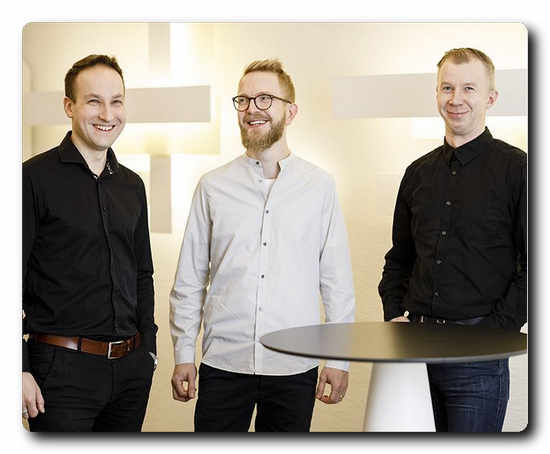 Metsä Board strengthens its packaging design services
Metsä Board strengthens its packaging design services
Iiro Numminen, Metsä Board’s new Structural Packaging Designer, has worked as a structural designer for almost eight years and has a deep knowledge of production methods related to the conversion of paperboard as well as digital tools. He constantly seeks new innovative ways to use the fibre based materials. His latest innovation ‘Stretching Inner Part’ was chosen as the winner of Metsä Board’s Better with Less – Design Challenge in 2018. He moves to Metsä Board from the packaging design team at Pa-Hu Oy, a manufacturer of corrugated board and packaging solutions.
Says Ilkka Harju, Packaging Services Director, EMEA: “We are pleased to have extended our global Packaging Services expertise with the appointments of both Marko and Iiro. Both are highly experienced designers with extensive knowledge of the requirements for sustainable, efficient and high impact branding and packaging.”
Metsä Board
www.metsaboard.com
Metsä Board is a leading European producer of premium fresh fibre paperboards including folding boxboards, food service boards and white kraftliners. Our lightweight paperboards are developed to provide better, safer and more sustainable solutions for consumer goods as well as retail-ready and food service applications. We work together with our customers on a global scale to innovate solutions for better consumer experiences with less environmental impact. The pure fresh fibres Metsä Board uses are a renewable resource, traceable to origin in sustainably managed northern forests.
The global sales network of Metsä Board supports customers worldwide, including brand owners, retailers, converters and merchants. In 2017, the company’s sales totalled EUR 1.8 billion, and it has approximately 2,350 employees. Metsä Board, part of Metsä Group, is listed on the Nasdaq Helsinki.
Metsä Group
www.metsagroup.com
Metsä Group is a forerunner in bioeconomy utilising renewable wood from sustainably managed northern forests. Metsä Group focuses on wood supply and forest services, wood products, pulp, fresh fibre paperboards and tissue and cooking papers.
Metsä Group’s sales totalled EUR 5.0 billion in 2017, and it employs approximately 9,100 people. The Group operates in nearly 30 countries. Metsäliitto Cooperative is the parent company of Metsä Group and owned by approximately 104,000 Finnish forest owners.
Yokogawa to release a real-time Cavitation Detection System
–An OpreX Asset Management and Integrity family solution that helps to prevent equipment degradation and improves the efficiency of plant maintenance–
Yokogawa Electric Corporation has announced that it has developed a cavitation detection system and has been available since January 31st. By detecting cavitation, quantifying information, and displaying the data in real time, this system provides an early indication of conditions that can result in a degradation in pump performance. By detecting problems early, before damage occurs which can cause an increase in both vibration and noise levels, this solution improves the efficiency of plant maintenance.
Development Background
Cavitation in fluids can cause damage to pumps. To minimise this damage, it is necessary to detect cavitation at an early stage and take corrective measures such as adjusting the flow rate. One issue, however, is that there has been no way to quantify cavitation. In addition, since cavitation occurs inside equipment, it is impossible to visually check whether this is occurring. Cavitation is usually detected by field personnel who rely on experience gained on the job to detect changes in vibration and noise levels that are caused by excessive cavitation. However, even highly experienced plant personnel and specialists can miss these early signs, and such problems may go undetected until the inevitable increase in vibration and noise occurs.
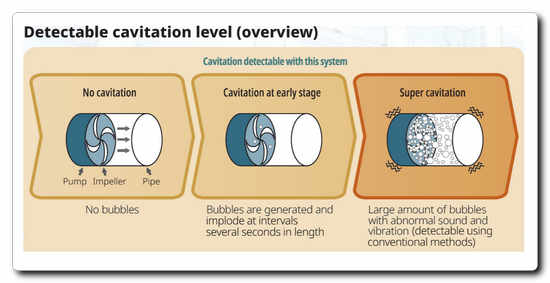
In its analysis of this problem, Yokogawa has focused on the principle that there is a direct relationship between differential pressure and cavitation, and has created a condition monitoring solution that involves the quantification of cavitation based on pressure data.
Product Features
- Real-time detection
The system that Yokogawa has developed consists of a STARDOMTM FCN-500 network-based control system, a Yokogawa cavitation detection logic program, and a highly accurate (±0.075%) DPharp EJX110A differential pressure transmitter, and relies on the FOUNDATIONTM Fieldbus industrial digital communication standard to link these components. At 100 ms intervals, the DPharp transmitter measures the pressure inside the target equipment, and this data is transmitted via the fieldbus network to the STARDOM FCN-500 system for processing in real time by the logic program. This system is therefore able to detect cavitation issues early on, allowing field personnel to take quick remedial action by, for example, reducing the flow rate to a level that suppresses cavitation without interfering with production line operations.
- Troubleshooting
Valves, pumps, and other types of plant equipment can all experience problems such as cavitation which are caused by anything from the opening/closing of a valve, a change in viscosity level or some other physical property of a liquid, or a change in the external environment. Field personnel have traditionally relied on their own experiences and the use of analytical tools to find out what is causing these problems. Thanks to the development of this new system, field personnel will now have a tool that will help them troubleshoot problems with greater efficiency by identifying and quantifying cavitation in plant equipment.
Major Target Markets
Oil, petrochemicals, chemicals, iron and steel, pulp and paper, water supply and wastewater treatment, pharmaceuticals, food, etc.
Major Applications
Maintenance of plant facilities such as pumps that tend to deteriorate due to cavitation.
For more information
Note: There is no universal indicator for the extent of cavitation and these images are only rough descriptions of the different levels of cavitation.
About OpreX™
OpreX is the comprehensive brand for Yokogawa's industrial automation (IA) and control business. The OpreX name stands for excellence in the technologies and solutions that Yokogawa cultivates through the co-creation of value with its customers, and encompasses the entire range of Yokogawa's IA products, services, and solutions. This brand comprises the following five categories: OpreX Transformation, OpreX Control, OpreX Measurement, OpreX Execution, and OpreX Lifecycle. The real-time cavitation detection system is an OpreX Asset Management and Integrity family solution in the OpreX Transformation category, which delivers operational excellence throughout an enterprise's activities, from production through to supply chain optimisation and risk and business management.
With this brand, Yokogawa will deliver integrated solutions that address specific needs and support its customers in their efforts to transform and grow their businesses.
About Yokogawa
Founded in 1915, Yokogawa engages in broad-ranging activities in the areas of measurement, control, and information. The industrial automation business provides vital products, services, and solutions to a diverse range of process industries including oil, chemicals, natural gas, power, iron and steel, and pulp and paper. With the life innovation business the company aims to radically improve productivity across the pharmaceutical and food industry value chains. The test & measurement, aviation, and other businesses continue to provide essential instruments and equipment with industry-leading precision and reliability. Yokogawa co-innovates with its customers through a global network of 112 companies spanning 61 countries, generating US$3.8 billion in sales in FY2017. For more information, please visit www.yokogawa.com/
About Yokogawa Europe B.V.
The European headquarters of Yokogawa were founded in Amersfoort in the Netherlands in 1982. Throughout Europe Yokogawa has its own sales, service and engineering operations. This dedicated network has been extended to Central and East Europe to further enhance the coverage and support associated with serving the process control and automation market place. Yokogawa develops and produces flowmeters at Rota Yokogawa in Germany and liquid analysers and industrial safety systems in the Netherlands. In addition to this dedicated network of Yokogawa subsidiaries, a select organisation of Test & Measurement (T&M) subsidiaries and distributors is established in certain areas to support the specific customer needs of this continuously developing and specific market of T&M instrumentation.
Thermal Paper Sales Witness Subdued Growth as Shift to Digital Payment Reduces Demand
Thermal papers market is likely to be complemented by steady demand from packaging and healthcare sectors.
In 2018, over 3.1 million tons of thermal papers were sold globally and the consumption is likely to grow at a subdued rate of 2.7% in 2019, according to Fact.MR’s latest study. Retail industry continues to be the largest end-user, accounting for over half of global demand in 2018. Macro trends impacting the retail industry are also rubbing off on thermal papers demand, according to the study. Growing adoption of digital payment methods in retail stores is likely to result in declining demand.
“Thermal papers marketplace has been under the influence of a number of skirmishes wherein use of bisphenols has remained at the top of mind of thermal paper manufacturers and environmental protection agencies. However, product improvements and introduction of bisphenol-free thermal papers have sustained thermal paper utilization in traditional applications,” says a senior research consultant S N Jha at Fact.MR.
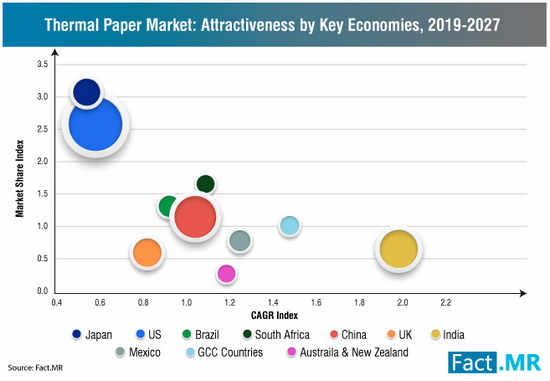
Application in Point of Sale (POS) Receipts Accounts for Hefty Demand
Application in point of sale (POS) receipts continues to account for a significant share in the thermal papers market. The study shows that use of thermal papers in the point of sale receipt application accounted for nearly 71% of the global demand in 2018. Point-of-sale commerce is the prime platform of bill exchange in multiple industries where cash and sometimes card-based transactions are involved.
While estimating the future prospects of thermal papers market, the study has considered increasing penetration of e-commerce platform and digital payment methods in the retail industry leading to decreasing demand for point of sale commerce in the future.
The thermal paper industry has witnessed a number of skirmishes in the past decade. Bisphenols used in thermal paper manufacturing and associated harmful effects have been in limelight. While a handful of manufacturers have introduced bisphenol-free thermal papers, the industry witnessed a significant shift from bisphenol A to bisphenol S. And the use of bisphenol S continues to bemuse governments as its impact remain unanalyzed.
Thermal Papers with 60-80 Microns Thickness Remain Preferred among End-users
The study evaluates that demand for 60-80 micron thick thermal papers remains higher among end-users. In 2018, over 70% of the thermal papers consumed were of the thickness range 60-80 microns.
As 60-80 micron of thickness falls in the optimum range of end-user requirement of durability and more paper on each roll, Fact.MR finds its considerable consumption across end-users. Rest of the volume consumption was on account of demand for thermal papers with 80-90 microns thickness whose application remain restricted to specific uses.
Fact.MR finds that technology-wise, direct thermal technology as well as thermal transfer technology witness equal penetration, however, higher demand for direct thermal printing has resulted in greater volume share of thermal papers made for direct thermal printing. Affordability and convenience of use are prime factors that favored the greater share of direct thermal printing papers.
Thermal transfer technology is highly sought after in applications that demand a high level of product differentiation such as marketing, brand image, compact and detailed barcodes and certification labels.
Demand for thermal papers remains consolidated in North America. The estimates find that North America accounted for nearly one third of the global thermal papers consumption in 2018. Europe and APEJ followed suit in and generated comparable demand for thermal papers in 2018. Buoyancy in the end-use industries and a strong distribution network of prominent thermal paper provides in these regions are factors driving the sales of thermal papers.
According to the report, the thermal papers market is projected to grow at 2.7% CAGR through 2027.
The insights presented here are from a research study on Thermal Papers Market by Fact.MR
Valmet continues the reshaping of its internal IT services and signs a business transfer agreement with Capgemini
Valmet takes key steps to continue the reshaping of its internal Information Technology (IT) services aimed at shifting focus towards planning, building and deploying new IT-enabled, value-adding capabilities and supporting businesses. The set of actions to be taken include a business transfer agreement signed with Capgemini.
 Under the agreement Valmet IT's application development and maintenance services, including application maintenance and support services, application development services and platform management services, will be moved from Valmet and its current partners to Capgemini.
Under the agreement Valmet IT's application development and maintenance services, including application maintenance and support services, application development services and platform management services, will be moved from Valmet and its current partners to Capgemini.
The transfer agreement concerns a total of 38 current Valmet IT employees in Finland, Sweden and Portugal. Today, Valmet IT employs about 150 IT professionals. Employees in scope will be offered to transfer to Capgemini with similar terms. The transfer is targeted to become effective on March 1 and the full transfer project is to be closed by the end of July 2019.
The transfer together with connected organizational changes and other initiatives will enable Valmet IT to clearly shift its focus from running existing IT services towards creating and deploying new IT-enabled services and products. These can, for example, be related to Industrial Internet, product lifecycle management (PLM) and field service capabilities. In addition, the transfer of IT application development and maintenance services will further enhance Valmet's IT services and supplier management.
"With these actions we will continue to shift our focus towards more strategic, value-adding activities, and thus support Valmet's businesses and contribute to Valmet's future success. Transferring the IT application development and maintenance services, after a careful evaluation process, to Capgemini is one of the key steps in executing our IT transformation," says Janne Puustinen, Vice President, Information Technology, Valmet.
About Capgemini
A global leader in consulting, technology services and digital transformation, Capgemini is at the forefront of innovation to address the entire breadth of clients' opportunities in the evolving world of cloud, digital and platforms. It is a multicultural company of 200,000 team members in over 40 countries. The Group reported 2017 global revenues of EUR 12.8 billion.
Valmet is the leading global developer and supplier of process technologies, automation and services for the pulp, paper and energy industries. We aim to become the global champion in serving our customers.
Valmet's strong technology offering includes pulp mills, tissue, board and paper production lines, as well as power plants for bioenergy production. Our advanced services and automation solutions improve the reliability and performance of our customers' processes and enhance the effective utilization of raw materials and energy.
Valmet's net sales in 2017 were approximately EUR 3.1 billion. Our more than 12,000 professionals around the world work close to our customers and are committed to moving our customers' performance forward - every day. Valmet's head office is in Espoo, Finland and its shares are listed on the Nasdaq Helsinki.
Wolverhampton paper business purchases new premises with support from hsbc uk
Wolverhampton-based Task Consumer Products, a family-owned paper converter and manufacturer, has purchased a new 80,000 sq ft site with support from a £7.8 million HSBC UK loan.
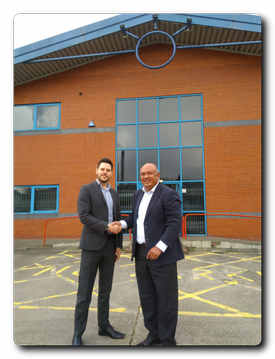 The HSBC UK funding has allowed Task Consumer Products to complete this purchase to enable the business to further increase its production capabilities by 15,000 tonnes per year, as the new facility creates the opportunity to install further production lines and store a larger quantity of products. This increase in output will in turn create 10 new jobs on the factory floor.
The HSBC UK funding has allowed Task Consumer Products to complete this purchase to enable the business to further increase its production capabilities by 15,000 tonnes per year, as the new facility creates the opportunity to install further production lines and store a larger quantity of products. This increase in output will in turn create 10 new jobs on the factory floor.
The new premises will be Task Consumer Products second site, the primary site being a 250,000 sq ft site based on Stafford Rd, Wolverhampton. It will initially be used as a storage and warehouse facility, with plans for an entirely new production line to be housed on-site in the near future. The production line will modernise the firm’s manufacturing capabilities, with the implementation of state-of-the-art equipment in the new factory.
Ravi Patel, Managing Director at Task Consumer Products, said: “The opening of our second site is an important milestone. Increasing our production and storage capabilities will be vital to the continued growth of our business. I’d like to thank our HSBC UK Relationship Director, Jack Turner, for his continued support throughout this process.”
Task Consumer Products, which was founded by Ravi Patel in 2007, purchases kitchen and toilet roll in large reels that it then converts into finished retail products for the supermarkets and leading brands. The new site will service multiple retail locations and supermarkets, increasing the efficiency of the firm’s distribution network.
David Ramsden, West Midlands Corporate Banking Area Director at HSBC UK, said: “We are glad to be able to support a growing family brand in the West Midlands. As one of the largest independent converters in the UK, Task Consumer Products has already delivered impressive results and we are looking forward to seeing the impacts of the new facility.”
HSBC UK:
HSBC UK serves around 14.5 million customers across the UK, supported by 32,000 colleagues. HSBC UK offers a complete range of retail banking and wealth management to personal and private banking customers, as well as commercial banking for small to medium businesses and large corporates.
HSBC UK Bank plc is a wholly owned subsidiary of HSBC Holdings plc, which is part of the HSBC Group – one of the world’s largest banking and financial services groups with assets of US$2,603bn at 30 September 2018. Linked by advanced technology, the HSBC Group serves customers worldwide from around 3,800 offices in 66 countries and territories in Europe, Asia, North and Latin America, and the Middle East and North Africa.
ANDRITZ to convert former groundwood reject system to TMP line at JSC Volga, Russia
International technology Group ANDRITZ has received an order from JSC Volga in Balakhna, Nizhnij Novgorod Region, Russia, to rebuild the existing groundwood reject line into a TMP (thermo-mechanical pulping) line. Start-up is scheduled for the third quarter of 2019.
The new 180 bdmt/d TMP line will process spruce as raw material to feed existing paper machines. In order to increase the capacity of newspaper production significantly, ANDRITZ will rearrange the existing parallel layout of high-consistency (HC) refiners to a two-stage HC refining set-up and install a new chip washing and HC refiner feeding system with a new plug screw feeder and an ANDRITZ DiscFilter.
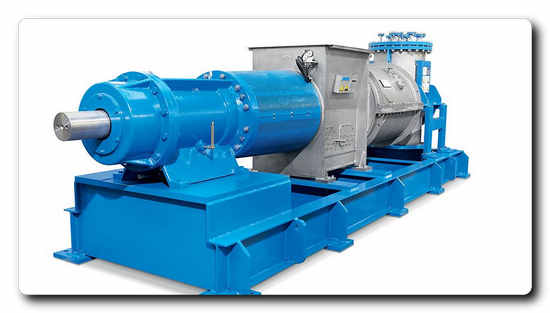 ANDRITZ plug screw feeder used in the new high-consistency refiner feeding system. “Photo: ANDRITZ”.
ANDRITZ plug screw feeder used in the new high-consistency refiner feeding system. “Photo: ANDRITZ”.
The project also comprises modernization of the existing screening and low-consistency refining system and includes the complete automation and electrification equipment with DCS system. Engineering, training, advisory services for mechanical installation work, commissioning, and start-up are also part of the scope.
JSC Volga is one of the largest Russian newsprint producers and uses 100% TMP as furnish. The company is one of the top 200 exporting companies in Russia, also ranking among the top 50 companies in the Russian forestry industry and the top 100 companies in the Nizhnij Novgorod Region.
ANDRITZ PULP & PAPER
ANDRITZ Pulp & Paper is a leading global supplier of complete plants, systems, equipment, and comprehensive services for the production and processing of all types of pulp, paper, board, and tissue. The technologies cover processing of logs, annual fibers, and waste paper; production of chemical pulp, mechanical pulp, and recycled fibers; recovery and reuse of chemicals; preparation of paper machine furnish; production of paper, board, and tissue; sizing, calendering and coating of paper; as well as treatment of reject materials and sludge. The service offering includes system and machine modernization, rebuilds, spare and wear parts, on-site and workshop services, optimization of process performance, maintenance and automation solutions, as well as machine relocation and second-hand equipment. Biomass, steam and recovery boilers for power production, gasification and flue gas cleaning plants, systems and plants for the production of nonwovens, dissolving pulp, and panelboard (MDF), as well as recycling and shredding solutions for various waste materials also form a part of this business area. OPTIMA OSR packaging machine: High speed coupled with flexibility
OPTIMA at Tissue World Milan
With machines like the OSR, Optima is offering what is currently technically feasible in terms of performance and flexibility. The company will also be showcasing its extensive range of the latest machines and digital services at Tissue World Milan.
Optima Nonwovens offers cutting-edge technologies for packaging paper hygiene products. The OPTIMA OSR, which is just one of the machines that visitors can find out more about in Milan, is specifically designed to process kitchen and toilet rolls. The machine can be used to produce single-layer and multi-layer packaging. The OPTIMA OSR covers the entire spectrum, from small to large pack sizes (min. 100 mm x 150 mm x 95 mm up to max. 650 mm x 650 mm x 300 mm). The product is packed in prefabricated plastic bags, including those with user-friendly carrying handles and perforations for easier opening. The performance of the two-lane version can reach up to 150 packs a minute.
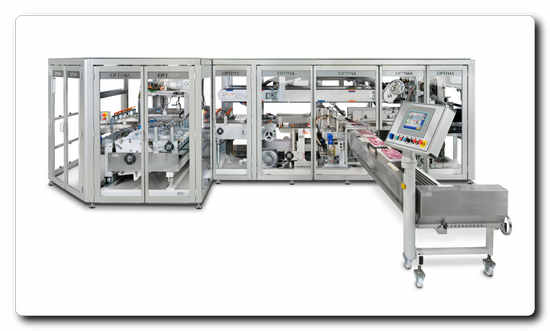
At Tissue World, Optima Nonwovens will also be presenting leading packaging solutions for other paper hygiene products such as paper towels, napkins, wet wipes, and cotton pads. Thanks to their modular design, Optima machines can be easily adapted to meet specific customer requirements. They are also characterized by their format flexibility and quick and easy format changes.
In order to achieve fully automated lines, control stations and secondary packaging machines can be integrated into the systems. The issue of “sustainability” is also one of the focal points of the fair – Optima is particularly interested in what paper hygiene product manufacturers want in this regard. Feedback from visitors will be collected at the Optima booth.
Optima at Tissue World Milan (Italy): March 25 to 27, 2019, Hall 3, booth no. E10
